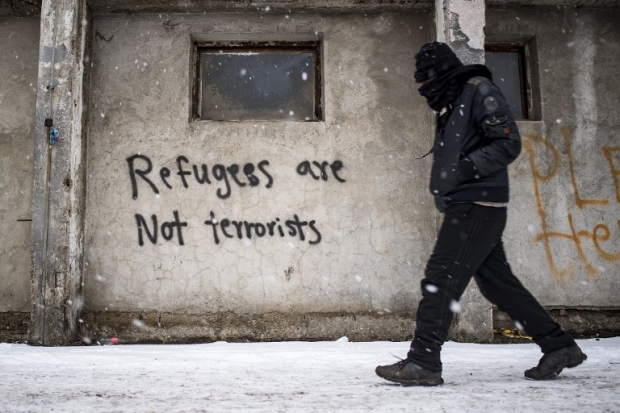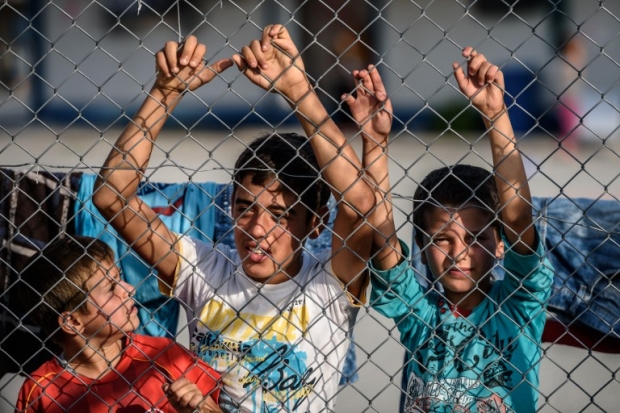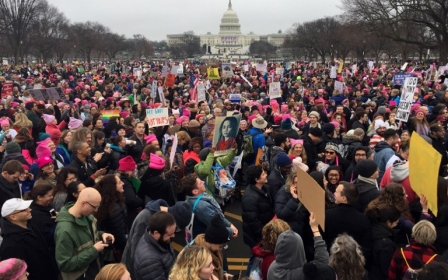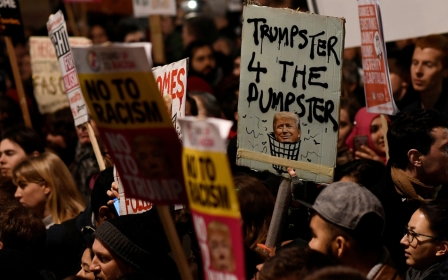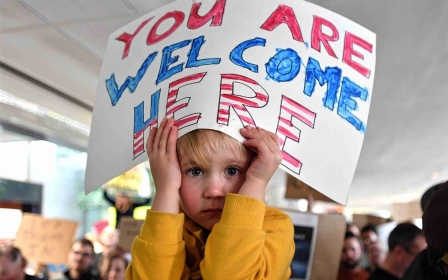Trump and the EU are two sides of the same coin when it comes to refugees
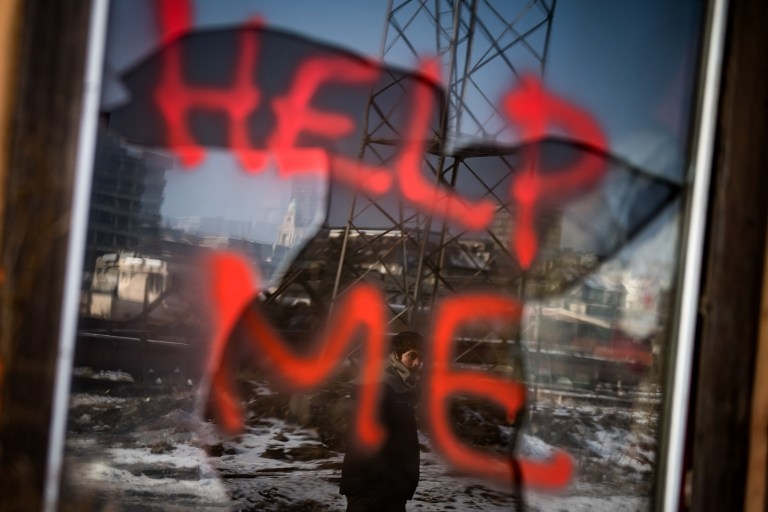
In the midst of the media outrage on Donald Trump's travel ban on seven Muslim-majority countries, few will have read the story of Samuel, a six year old boy from Congo whose body was found washed up on a beach in Cadiz, on the southwest coast of Spain.
What Trump calls a wall, the EU called Operation Triton. What he calls a ban, the EU called an EU-Turkey deal
Samuel is one in hundreds of children who have died crossing the Mediterranean since the picture of Alan Kurdi made global headlines. The discovery of Samuel’s body prompted the local NGO Human Rights Association of Andalucía (APDHA) to release a statement accusing the EU of hypocrisy in its condemnation of Trump’s latest policies.
APDHA cannot understand, the statement said, how the EU’s foreign policy chief, Federica Mogherini, could condemn Trump’s ban when the "European Union remains shut to [immigrants] like a fortress".
Indeed, the EU reacted to Trump’s ban with virtuous rebukes that are unfortunately eerily at odds with its latest policies. "In Europe, we have a history that has taught us that ... you might end up being in a prison if you build all the walls around you," Mogherini said in response to Trump's executive order.
READ: Shameful: The EU fails to address the so-called 'refugee crisis'
Lamenting the possibility of the ban affecting European citizens, EU spokesman Margaritis Schinas was even more assertive: "In the European Union we do not discriminate on the basis of nationality, race or religion," he said.
But is it really so?
In other words, the EU is no match for the outspoken US president.
What Trump calls a wall, the EU called Operation Triton. What he calls a ban, the EU called an EU-Turkey deal.
But while some European countries have gone great lengths in helping refugees, the policies adopted by the EU and those currently implemented by Trump boil down to the same determination to seal borders by all means possible.
No walls, but coastal patrol
In 2014, the Italian government repeatedly turned to the EU asking for help. It had been spending $9.5m a month on a year-long naval and air operation – Mare Nostrum – that had saved 150,000 lives in the Mediterranean.
The number of deaths, however, dramatically went up from 17 to 900. As navy ships patrolled European borders, one in 23 migrants were drowning at sea.
But its stagnant economy could not sustain the expenses any longer and Italy requested the EU’s assistance in setting up a joint rescue operation.
The EU’s reply was thanks, but no thanks. Several countries, most notably the UK, argued that rescue operations such as Mare Nostrum provided an “unintended pull factor” for migrants.
Operation Triton, conducted by the EU’s border security agency Frontex with the voluntary collaboration of a few member states, was launched as a replacement.
The joint budget of such joint operation went down from $9.5m spent by a single country to a maximum of $3m per month. Most importantly, Triton was a border security operation, stripped of the humanitarian objective of saving lives.
Francois Crepeau, the UN rapporteur on migrant rights, said the EU’s decision amounted to saying "let them die because this is good deterrence".
The number of deaths, however, dramatically went up from 17 to 900. As navy ships patrolled European borders, one in 23 migrants were drowning at sea. The previous year, the life-saving operations of a single country had brought the odds down to one in 50.
READ: Dear Theresa May, your policies make it hard to feel like I belong in Britain
Critics argued that the EU’s short-sighted policy of deterrence was equivalent to “killing migrants by neglect”. As Charles Heller, professor at Goldsmiths University of London, puts it, “can we really qualify the ending of Mare Nostrum and its replacement with Triton in all knowledge of the consequences this would have, as a mistake?”
If the answer is no, then the European Union is also guilty of having erected a wall, one way deadlier than any Trump could ever build along the US-Mexico border.
No ban, but a deal with Turkey
On 18 March 2016, the EU signed an agreement with Turkey to stem the refugee flows to Greece, mainly of Syrian, Iraqi and Afghani citizens.
In exchange for a generous €3bn ($3.23bn), Turkey committed to accepting the return of asylum seekers who travelled to Greece through Turkey. While the deal closed the gates of Fortress Europe to asylum seekers, it opened them to Turkish citizens through visa liberalisations - in defiance of the EU spokesman’s words on non-discrimination on the basis of nationality.
To be fair, only 578 returns took place by September 2016 – making the agreement a bargain for Turkey. As part of the deal, 1,614 Syrian refugees were also legally resettled in the EU.
The main motive of concern, however, is that the deal rested on another false premise. Turkey was designated by the EU as a “safe third country” that refugees could legally be sent back to, while well-established organisations like Human Rights Watch (HRW) expressed alarm.
Turkey 'not safe'
As HRW stated, Syrian asylum seekers are not granted full protection in Turkey according to the standards set by the 1951 Refugees Convention. The accelerated border process envisaged as part of the deal also puts refugees at risk of being returned without proper examination of their personal file and an assessment of their vulnerability.
“If chaos characterised the response of the EU and its member states in 2015, wrong-headed and rights-abusing policies have defined 2016,” Human Rights Watch stated. "[The EU-Turkey deal] has sent a message that protection for refugees could be commodified, outsourced, and blocked.”
While it is understandable for the EU to seek to regularise migration flows, it must do so while upholding higher moral standards than the ones of Donald Trump. The EU’s disregard for the consequences of its policies and bilateral agreements will otherwise turn Trump into a beacon of intellectual honesty.
- Federica Marsi is a journalism graduate from City University of London. Before moving to Beirut, she reported from Tunisia and the occupied Palestinian territories. Her work has been published on Al Jazeera, Vice UK, Open Democracy, The Middle East Magazine, Wired and others. Follow her @bocchia.
The views expressed in this article belong to the author and do not necessarily reflect the editorial policy of Middle East Eye.
Photo: A migrant is reflected in a window as he walks outside of a derelict warehouse used as a makeshift shelter near Belgrade's main railway station on 27 January 2017 (AFP).
This article is available in French on Middle East Eye French edition.
New MEE newsletter: Jerusalem Dispatch
Sign up to get the latest insights and analysis on Israel-Palestine, alongside Turkey Unpacked and other MEE newsletters
Middle East Eye delivers independent and unrivalled coverage and analysis of the Middle East, North Africa and beyond. To learn more about republishing this content and the associated fees, please fill out this form. More about MEE can be found here.



